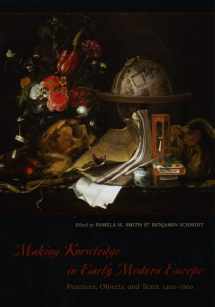
Making Knowledge in Early Modern Europe: Practices, Objects, and Texts, 1400 - 1800
ISBN-13:
9780226763286
ISBN-10:
0226763285
Edition:
Illustrated
Author:
Benjamin Schmidt, Pamela H. Smith
Publication date:
2008
Publisher:
University of Chicago Press
Format:
Hardcover
336 pages
Category:
European History
,
World History
,
History & Philosophy
FREE US shipping
Book details
ISBN-13:
9780226763286
ISBN-10:
0226763285
Edition:
Illustrated
Author:
Benjamin Schmidt, Pamela H. Smith
Publication date:
2008
Publisher:
University of Chicago Press
Format:
Hardcover
336 pages
Category:
European History
,
World History
,
History & Philosophy
Summary
Making Knowledge in Early Modern Europe: Practices, Objects, and Texts, 1400 - 1800 (ISBN-13: 9780226763286 and ISBN-10: 0226763285), written by authors
Benjamin Schmidt, Pamela H. Smith, was published by University of Chicago Press in 2008.
With an overall rating of 3.9 stars, it's a notable title among other
European History
(World History, History & Philosophy) books. You can easily purchase or rent Making Knowledge in Early Modern Europe: Practices, Objects, and Texts, 1400 - 1800 (Hardcover) from BooksRun,
along with many other new and used
European History
books
and textbooks.
And, if you're looking to sell your copy, our current buyback offer is $0.5.
Description
The fruits of knowledge—such as books, data, and ideas—tend to generate far more attention than the ways in which knowledge is produced and acquired. Correcting this imbalance, Making Knowledge in Early Modern Europe brings together a wide-ranging yet tightly integrated series of essays that explore how knowledge was obtained and demonstrated in Europe during an intellectually explosive four centuries, when standard methods of inquiry took shape across several fields of intellectual pursuit.Composed by scholars in disciplines ranging from the history of science to art history to religious studies, the pieces collected here look at the production and consumption of knowledge as a social process within many different communities. They focus, in particular, on how the methods employed by scientists and intellectuals came to interact with the practices of craftspeople and practitioners to create new ways of knowing. Examining the role of texts, reading habits, painting methods, and countless other forms of knowledge making, this volume brilliantly illuminates the myriad ways these processes affected and were affected by the period’s monumental shifts in culture and learning.


We would LOVE it if you could help us and other readers by reviewing the book
Book review

Congratulations! We have received your book review.
{user}
{createdAt}
by {truncated_author}


